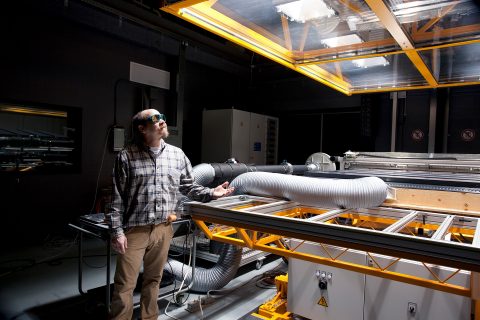Environmental Assessment (MEnv)
Program overview
The MEnv in Environmental Assessment gives you a comprehensive background in scoping, data collection and analysis, and Geographical Information Systems (GIS). You will explore all aspects and methodologies of the environmental assessment process as you effectively analyze technical reports and oversee complex projects. Objective assessments must identify all environmental risks associated with a proposal and offer solutions to mitigate those concerns. You will benefit from a four-month internship where you will work under professional supervision in a field related to environmental assessment. Potential placement after graduation includes all levels of government, international agencies, non-governmental organizations and private corporations. Now more than ever, we need specialists in federal environmental laws and policies to effectively develop impact studies before plans or programs are carried out.
Program structure
Degree Requirements
Fully-qualified candidates are required to complete a minimum of 45 credits.
Please see the Geography, Planning and Environment Courses page for course descriptions.
Environmental Assessment MEnv (45 credits)
| 21 | credits of Compulsory Courses: |
| 6 | credits of Elective Courses: |
| 18 | credits of Internship and Internship-related courses: |
Admission requirements
Admission Requirements
- Bachelor’s degree in an appropriate discipline in Arts or Science from a recognized university with a minimum GPA of 3.30 out of 4.30.
- Strong language skills in English and/or French.
- Proficiency in English. Applicants whose primary language is not English must demonstrate that their knowledge of English is sufficient to pursue graduate studies in their chosen field. Please refer to the English language proficiency page for further information on requirements and exemptions.
Application process
Application deadlines

FALL
February 1 (Canadian resident)
January 15 (U.S. and international)

WINTER
n/a

SUMMER
n/a
Priority will be given to complete applications submitted by the deadline. In some cases, programs may continue to accept applications as long as there is space available.
International students: Considering the waiting period involved in meeting the entry requirements to Canada and Quebec, we strongly encourage international applicants to apply early and submit supporting documents prior to the deadline.
Tuition & funding
Tuition and fees
Tuition and fees of the program may depend on your student status, among other key factors. Estimate these costs based on the most common situations.
Awards and funding
Funding packages are generally available for students in thesis-based programs. Course-based students may be eligible for a number of donor awards, and may consult with their department for program-specific opportunities.
Out-of-province students
Get $3,000 in special funding for non-thesis master's programs. Learn more
Other programs of interest

Develop a sound understanding of the processes and methodologies of environmental assessment in the fields of environmental planning, sustainable development and resource decision-making.
Department
Department of Geography, Planning and Environment
Faculty

